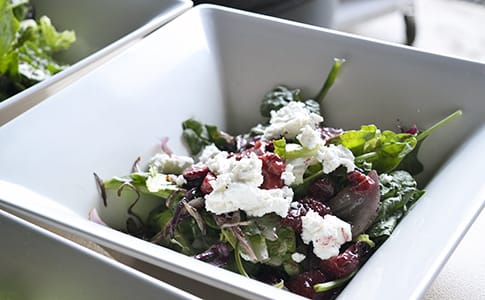A dining experience that tops ‘Best Campus Food’ lists

At the Farm to Fork Dinner this fall, guests got a taste — literally — of why St. Olaf College routinely ranks near the top of “Best Campus Food” lists.
They were treated to a local meal that began with a spinach salad with sherry shallot vinaigrette, balsamic red onions, local goat cheese, and roasted strawberries. The main course included red wine braised duck with mushrooms and capicola, roasted rib eye with smoky heirloom tomato salsa, roasted squash sprinkled with “Charles Dickens dust,” and mashed potatoes with cheese.
The meal featured squash from Open Hands farm, Amablu cheese from Faribault Dairy Company, and mushrooms from Forest Mushrooms Incorporated in St. Joseph, among a plethora of other local ingredients.

The Farm to Fork Dinner, an annual event for alumni hosted by St. Olaf food service provider Bon Appétit, showcases the college’s commitment to preparing fresh, locally sourced meals for its students.
In St. Olaf’s Stav Dining Hall, students routinely have turkey from Ferndale Turkey Farm, beef from Thousand Hills Cattle Co., and cream from Hastings Co-op Creamery Company — some of the nearly 20 local farms, bakeries, creameries, and co-ops that the college buys its ingredients from. Students know not only where the food is from, but also if it’s vegetarian, vegan, made without gluten-containing ingredients, or on the seafood watch list.

This commitment to quality is why St. Olaf regularly appears on “Best Campus Food” lists in national publications — including a No. 5 place in this year’s Princeton Review. The college’s top-notch fare has also been mentioned in Food & Wine, The Street by the Independent, and The Daily Meal, which highlighted menu options including “sage-crusted turkey with rustic raisin stuffing; beef- and rice-stuffed peppers; and chicken Florentine with penne pasta, artichokes, spinach, crimini mushrooms, tomatoes, and feta cheese.”
“The accolades we get are because of the team. We all have a vision and work together,” says St. Olaf Bon Appétit Chef Matthew Fogarty.
Designing delectable dishes
Fogarty decides what will be on the dining hall menu by thinking about what students would enjoy — and then he “tricks it out.” Student favorites include gado gado, an Indonesian vegetable salad with peanut sauce; made-to-order breakfast omelettes; crunchy sweet potato fries; and dense, gluten-free brownies.

St. Olaf’s Stav Hall, the main dining facility on campus, cooks up more than 70 entrees each week along with a wide selection of desserts each day.
It offers eight different food lines in addition to always-available soups, sandwiches, and salads.
The “Grains” line specializes in vegetarian options ranging from curry tofu to chickpea salads to tandoori vegetables. The “Tortilla” line has burritos and tacos, with specials ranging from stuffed peppers to roasted fall vegetables. The “Bowls” line offers stir fry, egg rolls, and potstickers. And the “Home” line offers the variety — and often the comfort food — of home, with options like tater tot hot dish and chicken pot pie.
A commitment to locally grown food
And all of this is done with a commitment to the Farm to Fork philosophy. This means that at least 20 percent of ingredients used in the cafeteria are from small, owner-operated farms and ranches located within 150 miles of the kitchen, with even higher rates during the growing season.

Among these local farms is St. Olaf Garden Research and Organic Works (STOGROW), a student-run farm founded in 2004 through an entrepreneurial grant provided by the college. The farm aims to practice sustainable farming methods; provide fresh, local vegetables, fruits, herbs, and flowers to the St. Olaf community; foster agricultural awareness; and educate students and the broader community about sustainable food production.
The college also works with the local farm just a few miles off campus, Open Hands. Two years ago Bon Appétit awarded Open Hands Farm a $5,000 grant to build a root storage facility and purchase washing and packing equipment. This grant has enabled the farm to increase the amount of root vegetables it sells to St. Olaf and to supply the college all winter long. The root storage facility holds about 100,000 pounds of carrots, beets, parsnips, and other roots.

Bon Appétit also purchases all of its shell eggs from cage-free farmers; uses fair trade organic coffee; only purchases seafood that is on the Seafood Watch “good” list, ensuring that the product has zero air miles and comes from within North America; and uses fair trade bananas from Ecuador. All of the chicken and liquid dairy products purchased are free of growth hormones and antibiotics.
Another important focus of food at St. Olaf is the commitment to sustainability. Each year about 175 tons of food waste is composted. All the compost that is generated is used on college-owned land in the landscaping and maintenance of the grounds.
All of these things — from the locally grown ingredients to the creativity of St. Olaf Bon Appétit chefs — play an important role in feeding thousands of St. Olaf students and visitors each year.